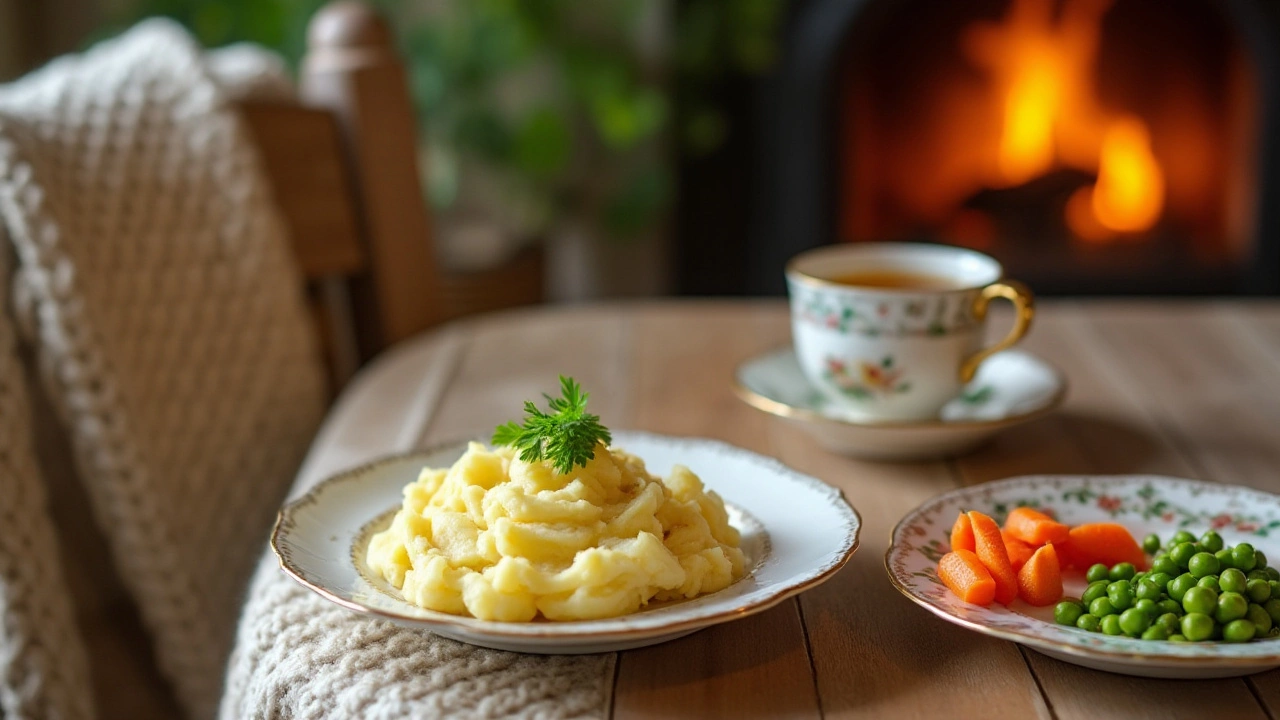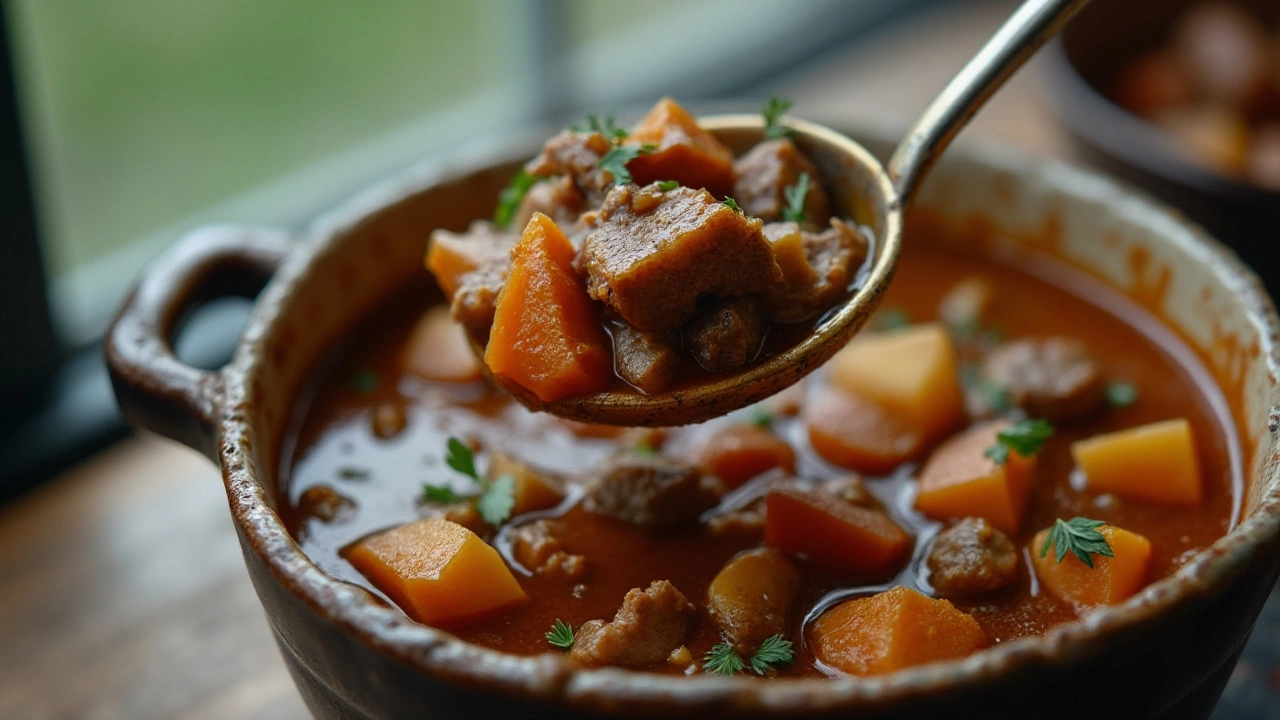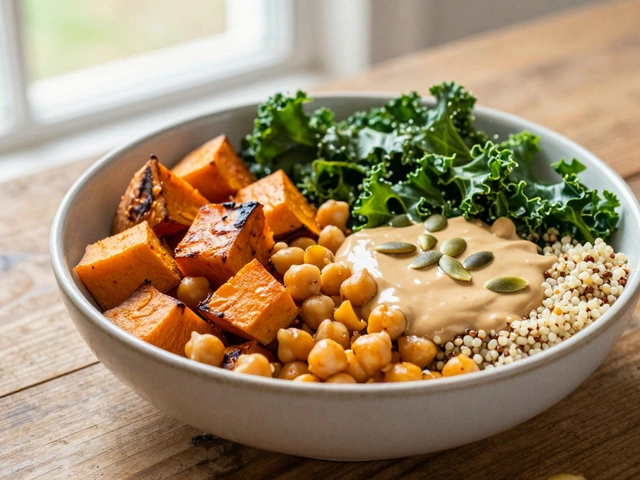
We've all been there — days when the common cold sneaks up, leaving us sniffling and sore. During these times, the right comfort food can be like a warm hug in a bowl. But not all comfort food is created equal, especially when it comes to aiding recovery.
This article explores some of the best choices for those gray days when you're tucked under a blanket. You’ll find classic recipes like chicken soup and a few surprises that pack potent healing power. Let's dive into the delicious world of comforting dishes that not only soothe the soul but also help you get back on your feet faster.
- The Power of Chicken Soup
- Healing with Ginger
- Stews and Broths
- Comforting Carbs
- Herbal Teas for Recovery
- Balanced and Nutrient-Rich Meals
The Power of Chicken Soup
Chicken soup has earned its place in folklore and medicine as a trusted remedy when illness strikes, and for good reason. Prepared with love and simple, wholesome ingredients, it's not just a flavorful dish but a soothing balm for the soul. Scientific studies have shown that chicken soup contains anti-inflammatory properties that can help alleviate the symptoms of upper respiratory tract infections. The warm broth can loosen congestion, helping to open nasal passages and soothe sore throats, making it a staple comfort food for many when feeling unwell.
One of the reasons chicken soup is so effective lies in its ingredients. Chicken is rich in protein, which is essential for the body's repair and recovery processes. Vegetables like carrots, onions, and celery not only add flavor but also provide vitamins and minerals that aid recovery. Traditionally, recipes include herbs like thyme and parsley, offering additional nutritional benefits. These ingredients simmer together, creating a nourishing broth that is both comforting and healing. The combination of warm liquid and nutrients works wonders in rehydrating the body, soothing the digestive system, and even lifting spirits when you're feeling under the weather.
It's no wonder that chicken soup has been embraced across cultures as a healing elixir. The act of consuming hot liquids itself offers immediate relief to the inflamed tissues of the throat. Interestingly, a study published in the journal "Chest" demonstrated that chicken soup might improve the function of cilia, tiny hair-like parts within our noses responsible for preventing infection. As Dr. Stephen Rennard, pulmonologist at the University of Nebraska Medical Center, noted in his research, sipping on chicken soup slows the growth of certain white blood cells responsible for inflammation, showing its natural role in healing.
Culinary historian Clifford A. Wright describes chicken soup as a "panacea that fits a remarkable variety of ailments," underscoring its revered status in every cuisine.
When preparing your own chicken soup, simplicity is key to preserving its healing properties. Start by simmering a whole chicken with water, allowing for a slow extraction of flavors and nutrients. Adding an array of vegetables not only enriches the broth but also supplies essential vitamins. For those seeking an extra ginger punch, which is known to boost immunity, a few slices can be added to the pot for a gentle, spicy warmth. Remember, this is more than just a recipe; it's a connection to age-old wisdom catered to nurture us in times of need. In the art of cooking this comfort dish, we embrace both tradition and the nourishment it provides.
Healing with Ginger
Ginger has long been celebrated in many cultures for its powerful healing properties. This knobby root is not only a staple in the kitchen for its spicy kick but also a trusted remedy for a variety of ailments. One of the most common uses of ginger is to alleviate nausea, whether from motion sickness, pregnancy, or as a side effect of chemotherapy. The active components, gingerols and shogaols, are largely responsible for these effects. These compounds have anti-inflammatory properties, making ginger a valuable tool in combating the symptoms of the common cold, flu, or any ailment that brings inflammation. Sipping on a warm cup of ginger tea can ease throat soreness and clear congestion, providing much-needed relief.
For those feeling under the weather, a simple ginger-infused broth can work wonders. Start with a basic vegetable or chicken broth, and add thin slices of fresh ginger. Let it simmer gently, allowing the ginger to release its spicy, aromatic oils into the broth. Not only does this make for a soothing and warming drink, but it also acts as a natural decongestant, helping to open up clogged sinuses and improving breathing. Plus, the comforting heat of the broth can promote perspiration, which may help to 'sweat out' a fever in a safe and natural way.
In addition to respiratory relief, ginger aids digestion. When the body is battling an illness, the digestive system often goes out of sync. Sipping ginger tea or chewing on a piece of candied ginger can stimulate saliva, bile, and gastric juices, which help digestion. Moreover, research suggests that ginger can shorten the duration of certain bacterial and viral infections, providing a natural way to assist the immune system. A study published in the Journal of Ethnopharmacology highlighted how ginger extract could inhibit the growth of several strains of bacteria, underscoring its potential as a gentle, plant-based antiseptic.
"Ginger not only tastes great, but it also has a long history of medicinal uses, including acting as an anti-inflammatory and a soothing agent for an array of gastrointestinal issues," says Dr. Andrew Weil, a leading holistic health expert.
For those looking to incorporate ginger into their diet during illness, there are countless creative ways to do so beyond the traditional tea. Try adding grated ginger to a warm bowl of oat porridge, mixed with honey for a sweet touch. Or consider making a ginger smoothie by blending fresh ginger with spinach, banana, and a splash of coconut water, which offers vitamins to help bolster energy levels when you're feeling depleted. For a savory twist, ginger can be combined into soups or stirred into creamy mashed potatoes for an unexpected zing.
Emphasizing ginger in your diet is a step toward nourishing the body back to health. Beyond its spiciness lies a depth of flavor and a wealth of healing benefits that can comfort and nurture, which indeed makes it an indispensable ingredient in the realm of comfort food for the sick.

Stews and Broths
There's a simple magic in stews and broths that has endured through centuries. These hearty concoctions not only offer nourishment but bring a sense of comfort and warmth, especially when you're feeling under the weather. Packed with vegetables, meats, and sometimes grains, stews are a perfect remedy for a cold day. The secret lies in their ability to be both satisfying and easy on the stomach. A slow simmer over a few hours enhances their nutritional content and flavor, making each spoonful a restorative delight.
Let's take a look at chicken broth, one of the most revered comfort foods worldwide. Known to contain anti-inflammatory substances, chicken broth helps reduce symptoms of upper respiratory infections. This liquid gold aids in keeping you hydrated, which is crucial when your body is battling an illness. It's no wonder it's often recommended by doctors and nutritionists alike. A flavorful homemade broth requires no more than a few ingredients—water, chicken bones, a variety of vegetables such as carrots, celery, and onion, and a pinch of seasoning. Even store-bought versions can be transformed into a healing brew with a few added herbs and spices.
For a heartier option, consider a beef stew. Rich in iron and protein, beef stews can give an energy boost when your body is feeling weak. Adding root vegetables like potatoes, turnips, and carrots not only thickens the stew but provides essential vitamins and minerals. The slow cooking process allows the beef to tenderize, making it easy to digest. And let's not forget legumes; lentils, for instance, are a wonderful addition for extra fiber and protein. As Mark Bittman once said,
The secret to making a good stew is in the patience you give it; let it reduce naturally to allow every ingredient to share its essence.His advice rings true in creating a palette of flavors that can only come from slow simmering.
While a classic beef stew is satisfying as is, there’s room for modern twists that include vegan and vegetarian alternatives. A vegetable stew featuring hearty greens, beans, and tomatoes can offer just as much comfort and nutrients. Incorporating mushrooms, with their meaty texture, fills the void left by the absence of meat. Spice it up with a mix of herbs and garlic to elevate its flavor profile. These adaptations ensure everyone, regardless of dietary preference, can enjoy the healing nature of stews and broths. The allure of these dishes isn't limited to how they taste; it's in their capacity to heal and bring joy.
Comforting Carbs
There is something uniquely satisfying about foods rich in carbohydrates, especially when you’re not feeling your best. Some might say these are the ultimate comfort food options. When it comes to nurturing both body and spirit, potatoes, rice, and noodles are staples that deliver warmth, satiety, and a sense of well-being. It's no wonder we crave mashed potatoes or a steaming pile of noodles when sick. These dishes not only provide energy but also often evoke fond memories, adding an emotional layer to their soothing qualities.
Consider mashed potatoes—soft, creamy, a little buttery. They're not just filling but also gentle on an upset stomach, making them a popular choice for those who need a mild-tasting, easy-to-digest meal. Add a bit of garlic or herbs for an extra nutritional boost, and you have a dish that comforts and heals. The potatoes themselves are a good source of vitamin C and B6, helping to support the immune system. It's fascinating how a simple tuber can make such a profound impact on your mood and energy levels.
"Carbohydrates, due to their serotonin-boosting potential, can make us feel happy and relaxed," says Dr. Walter Willett, professor of epidemiology and nutrition at Harvard School of Public Health.
When exploring rice, particularly varieties like brown rice or jasmine, you'll find they are not only easy on the digestive system but also versatile. You can prepare them in various forms to suit your mood—from basic boiled rice to a more elaborate rice pudding infused with cinnamon and nutmeg, which are known for their anti-inflammatory properties. This comforting combination can often ease the physical aches that accompany illnesses.
And let's not forget about noodles—the epitome of versatility. From classic chicken noodle soup to a ginger-infused noodle stir-fry, these simple strands are a sick-day staple worldwide. Their appeal extends beyond the mere comfort of them; they are easy to prepare, and you can adapt them to include a variety of herbs and spices that increase their healing power. It’s remarkable how a bowl of warmth can lift the spirits on the dreariest of days.
As you seek soothing meals to ease the discomfort of a fever or cold, remember that these comforting carbs do more than just fill your belly. They provide essential energy during recovery periods, and with a dash of creativity, you can easily enhance their nutritional profiles for a more comprehensive dietary solution, supporting both your physical health and your emotional well-being.

Herbal Teas for Recovery
When your body craves ease and comfort, nothing beats the simple pleasure of a steaming cup of herbal tea. From ancient traditions to modern-day practices, people around the world have cherished these warm concoctions for their ability to promote healing. Among the many options, certain herbal teas stand out for their unique qualities that can aid in soothing ailments and accelerating recovery. Take, for instance, ginger tea, which is heralded for its anti-inflammatory properties and ability to ease nausea.
Another hero in the realm of herbal teas is peppermint. With its cooling menthol flavor, peppermint tea acts as a natural decongestant, making it a popular choice when the sniffles set in. This refreshing brew can help clear sinuses and assist in digestion, bringing much-needed relief to an unsettled stomach. Then there's chamomile tea, known not just for its aromatic profile but for its calming properties that can reduce anxiety and promote restful sleep, both essential for recovery.
“Herbal teas are nature's gentle remedy, calling us to health with each soothing sip,” writes herbalist Penelope Ody.
When preparing these teas, one can enhance their efficacy by adding fresh lemon or a dash of honey, both rich in antioxidants and immune-boosting benefits. Creating your tea blend can also be a rewarding experience, combining various herbs to match your taste and needs. Not only do these teas warm the body, but they also instill a sense of ritual and tranquility which can be just as healing. A balanced selection of herbal teas ensures that you have companions in both wellness and illness, comforting the soul while nurturing the body.
For those interested in the science behind herbal teas, a few studies suggest that the polyphenols in these plants contribute significantly to their healing properties. These natural compounds are abundant in many herbs and have been shown to support the immune system. Whether you're looking for a comforting beverage or a medicinal aid, herbal teas offer a delicious way to foster health with each delightful cup.
Balanced and Nutrient-Rich Meals
When you're feeling under the weather, it's crucial to nourish your body with meals that are not only soothing but also packed with essential nutrients. A balanced meal is like the Swiss army knife of recovery, offering the right mix of vitamins, minerals, proteins, and healthy fats necessary for healing. Your body is working overtime to fight off whatever is ailing you, and providing it with fuel is like giving a runner the right shoes—it's about support and efficiency.
To create a nutrient-rich dish, consider meals that are visually colorful because they usually have varied nutrients. Green leafy vegetables are rich in iron and vitamin C, both crucial for boosting your immune system. The deep red hues of tomatoes, packed with lycopene, can be beneficial in reducing inflammation in the body. Pair these with lean proteins like chicken or tofu, which aid in cell repair and provide the energy you need neither to jump back nor rest as required.
Pro Tips for Building a Balanced Meal
When planning your meals, it's essential not to ignore carbohydrates, which are often unjustly demonized in the health world. Choose whole grains like quinoa or brown rice; they not only act as comfort carbs but also provide fiber that keeps your digestive system in check, something that's especially important when illness often disrupts normal routines. Do not underestimate the power of garlic; this little bulb is a powerhouse of allicin, known for its antiviral properties. Add it liberally to your meals for an extra health boost.
"Let food be thy medicine, and let medicine be thy food," said Hippocrates, the ancient Greek physician. That adage could not be more relevant when it comes to recovery-focused nutrition.
Balancing your plate doesn’t have to be a laborious task. Aim for a meal composition that includes half your plate filled with vegetables, a quarter with protein, and the last quarter with whole grains. Not only does this strategy ensure you’re getting a wide array of nutrients, but it also makes your meals more satisfying, keeping hunger at bay for longer periods. A small portion of nuts or seeds can provide the healthy fats needed for vitamin absorption, giving your body a comprehensive toolkit to fight off illness.
Here’s a quick and rejuvenating recipe to attempt: a quinoa bowl. Begin with cooked quinoa as your base, top it with sauteed spinach and kale, cherry tomatoes, and grilled chicken breast sliced into thin pieces. Drizzle the creation with a dressing made from olive oil, lemon juice, and minced garlic. This meal not only encompasses multiple elements from our discussions but makes for a vibrant, hearty, and wholesomely satisfying dish.





